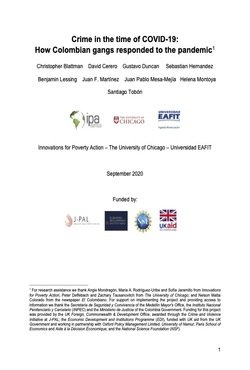Crime in the time of COVID-19: How Colombian gangs responded to the pandemic
By Christopher Blattman, et al.
Since the COVID-19 outbreak, scholars and journalists have spread anecdotes of gangs and criminal organizations coming to the aid of citizens, governing in place of the state. They report gang activities that range from enforcing lockdowns to providing goods and services to the poor and hungry. This is especially true in Latin America where thousands of gangs exert authority over civilians in large swaths of territory. Some argue that organized crime is stepping in where states have failed, seizing the chance to consolidate its position. But just how widespread is the kind of gang involvement that captures headlines? Are these anecdotes typical of how gangs are responding to COVID-19? Only systematic data can answer these questions and help assess whether the pandemic will ultimately strengthen organized crime’s grip on Latin American cities. We have spent four years studying criminal groups in Medellín, Colombia, a city with one of the highest concentrations of organized criminals in the world. If gangs respond to COVID-19 anywhere, it should be Medellín. Almost every low- and middle-income neighborhood in the city has a local gang that resolves disputes, polices the community, and often taxes businesses. As soon as the pandemic broke out, anecdotes about gang responses surfaced in Medellin. We set out to collect systematic data on gang and state governance before and during the pandemic. Despite the headlines, gang involvement in pandemic response is exceptional and mostly idiosyncratic. Surveying every low- and middle-income neighborhood in…..
-
Medellin, we find: ● Most welfare support to civilians came from state authorities rather than the gangs. ● Overall, state authorities played by far the largest role in enforcing quarantine rules. ● A small number of gangs, however, were highly involved in providing welfare and enforcing quarantine rules in their territories. ● These rare gang pandemic responses were relatively idiosyncratic. Whereas normal pre-pandemic gang rule is associated with a range of neighborhood characteristics, pandemic gang rule is not. Moreover, gang enforcement of pandemic lockdown or provision of services is almost uncorrelated with pre-pandemic levels of gang rule. We speculate that personal choices of the gangs and their leaders may have dominated in the first weeks of COVID-19.
Chicago: Innovations for Poverty Action – The University of Chicago – Universidad EAFIT, 2020. 19p.


